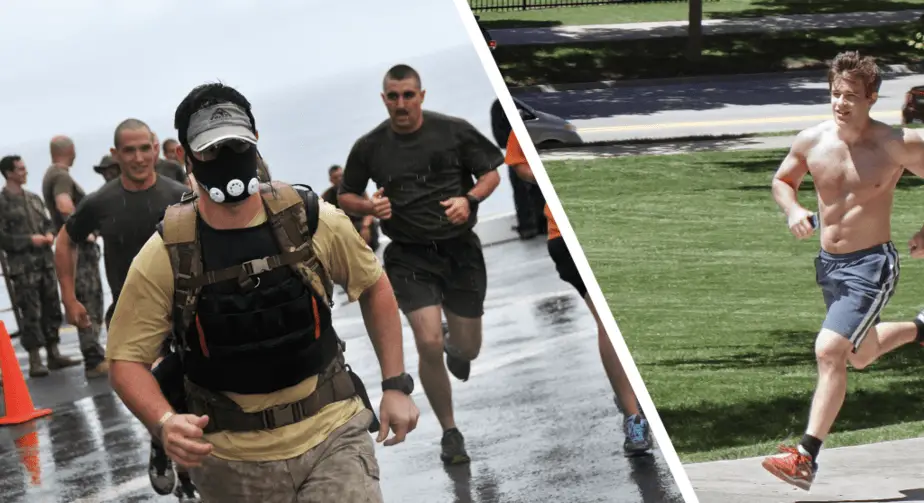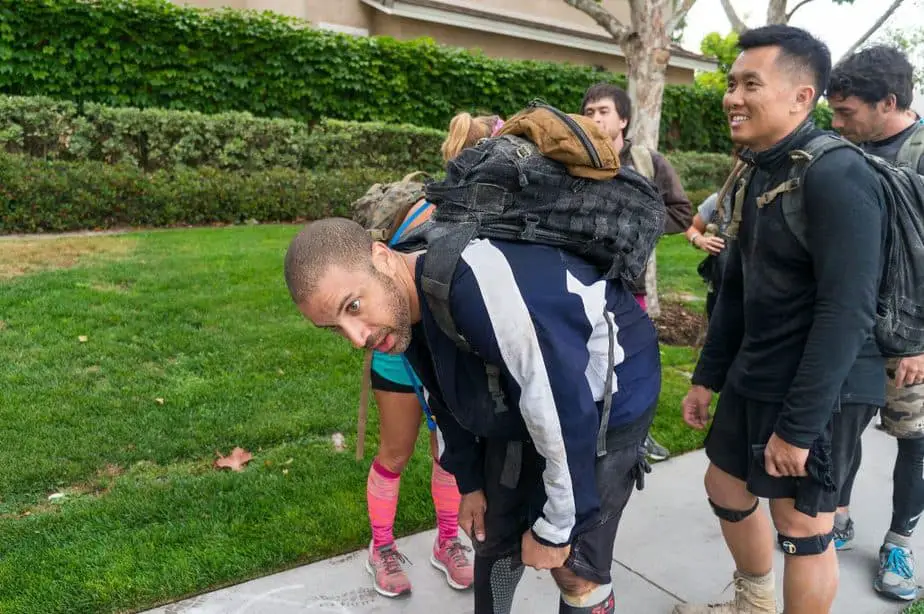
Ever wondered if you should hit the trail with a weighted backpack or lace up those running shoes? Well, you’re not alone! In this post, I share my own journey between rucking and running. We’ll touch on muscles, calories, injuries, and everything in between Let’s figure out which one suits your style and fitness goals.
How to Choose Between Rucking & Running
Personally, I’ve had experience with both rucking and running. I’ve detailed my full experience with taking on rucking to transform my body.
With that said, everyone has different challenges and preferences when choosing between them. If you’re on the fence between them both, here’s some things to consider to help you choose between them:
1- Rucking will get you different fitness results compared to Running
Rucking is more focused on building strength, while ensuring that you’re workouts put you at a heart rate that is exclusively in Zone 2 (where you’re not too out of breath that you can’t have a conversation. Rucking is more focused on body recomposition vs dropping weight – Rucking will focus on maintaining your current muscle mass.
Running is more focused on improving your cardiovascular fitness, it will get you running for longer distances without feeling exhausted the more you train. Also, running will burn more calories and is more focused on aerobic training.
For me personally, I found that a combination of rucking and CrossFit (which involves a lot of running and aerobic training) to be the best option as it allowed me to improve my aerobic fitness while maintaining my muscle mass. However, I do admit that it took a lot of time out of my day to balance both. Here’s my full experience.
If you’re more focused on burning calories quickly and shrinking in size, running is a better choice. If you’re more focused on losing fat and maintaining your current muscle mass (and are willing to wait longer) then rucking is a better choice.
2- If you’re more prone to injury, Rucking might be a better choice
Rucking is easier on your joints, it’s essentially walking with a weighted backpack. On the contrary, running is tougher on your joints to the constant high impact on your joints. Common injuries with running include back pain, knee pain, achilles tendonitis, and more (source). This is mainly because running is more intense as an exercise compare to rucking.
While rucking does come with it’s fair share or injuries (a lot of them cause by people being prone to those injuries and incorrect form), it’s no where near how easy it is to get injured from running.
Summary: If you’re more prone to injuries, you may want to consider rucking over running.
3- Short on time? Rucking may not be the best option
Rucking is considered to be a LISS (Low Intensity Steady State) workout. Since it’s not as intense, it does require more time to achieve the best results, per workout. As opposed to running, where a run of 5km takes an average of 30 – 40 minutes. A quick workout to get out of the way during your day.
Rucking for 30 minutes a day is also possible, but you’ll need to increase the weight quite substantially and you may want to consider an uphill terrain to increase the efficiency of your workout. Personally, I don’t find this sustainable long term, as it is rather exhausting and it will be hard to stick to a rucking workout program if your pushing yourself to the limit every workout. That’s what I found at least after having done this a couple of times.
To make your rucks more time efficient, you can consider loading your rucksack with heavier weight and ruck on a treadmill.
Summary: If you’re short on time, running is a better workout alternative. If you’re rucking and are short on time, you can consider increasing the weight and ruck uphill on an incline.
4- Expenses, Rucking is cheaper when first starting out.
When you first get into rucking, it will not require much of a budget, all you need to do is grab any backpack that you have, load it with any weights you have lying around (here’s a list of things around your home that you can add to your backpack for weight).
After that, when you’re at a more intermediate option, you may want to consider upgrading your gear with a better backpack, boots, rucking plates, rucking socks, and more.
With running, all you really need is proper running shoes, even if you’re first starting out. Later on, you may want to consider some accessories – but they’re not vital.
Summary: Rucking is cheaper than rucking when first starting out. Running is a cheaper option in the long run.
5- Running and Rucking are good, but the option that you can stick to consistently is the better option.
This is especially true when choosing between whether you should choose running over rucking or vice versa.
The quote that i read everyday and have as my phones background reads “Discipline will take you places motivation can’t“
The reason for that is that you’re much better choosing one of them (in spite of it’s disadvantages) as long as you’re able to stuck to a program and not miss a day of training. Consistency is often overlooked, but it’s the main reason people see results, regardless of their choice of exercise.
Summary: Long term, choosing running or rucking ultimately should be based on which one of the both you can see yourself sticking with for longer and consistently.
What’s the Difference Between Rucking & Running
| Rucking | Running |
| LISS | HIIT |
| Less prone to injuries | More prone to injuries |
| requires more gear | Does not require much gear |
| Works both cardiovascular system and strength | Only works on cardiovascular |
| More social of a sport | Less social of a sport |
People choose to ruck as opposed to running as it is easier to start. Regardless of your fitness level, as long as you can walk, you can ruck. So, why else do people choose rucking over running?
If the list below is not enough to convince you, here’s a complete list of rucking benefits!
Intensity
Rucking is a Low Intensity Interval Training (LISS) sport. Whereas running is considered to be a High Intensity form of training. Both are intense in different ways. Running is an Anaerobic form of exercise, meaning ‘without air’ and refers to the body producing energy without oxygen.
Rucking is the polar opposite, rucking is an aerobic form of exercise. Meaning you’ll probably have to perform the exercise much longer to get the benefits of it.
Injuries
For beginners, running is more intense than rucking, period. Meaning it comes with its set of challenges. While running is beneficial for you, it does come with its fair share of injuries. “runners knee”, shin splits, and Achilles tendinopathy are some of the common injuries among ruckers.
People of all ages are choosing to ruck as their main workout as other workout styles can make you more prone to injury. Check out my full interview with Jerry, a 65 year old man who specifically chose to ruck as a senior as he was having health issues and rucking was his gateway to sticking to a workout that he can stick to and see results
Whereas with rucking, as long as you monitor the amount of weight you carry, follow a beginners program, and maintain proper posture, you’ll be fine.
Expenses
Rucking in its simplicity only really requires a backpack with any form of weight. But the more your get into it, the more you notice that it does require you to up your gear.
For example, getting boots, upgrading your rucksack, etc. If you’re looking to upgrade your gear, but on your on a budget, check out our rucking on a budget post!
Cardio Vs Strength Training
Rucking involves you carrying a challenging weight for an extended period of time. This alone will build up both your upper and lower body strength while also working on your cardio. Running on the other hand is completely focused on cardio.
Social Life
There are tons of rucking group events and rucking clubs out there that get you out and about. Being social and getting out there is a social component that is rooted in the sport. We can’t say the same about running.

How Are Rucking & Running Similar?
| Rucking | Running |
| Burns a high number of calories | Burns a high number of calories |
| Same level of injury risk | Same level of injury risk |
| Great for your health | Great for your health |
| Accessible to everyone | Accessible to everyone |
Calories
Both sports burn a high number of calories. According to Keisan’s running calculator, a 25 year old male (180 lbs & 5’8 inches tall) running at 7mph burns approximately 857 calories.
When it comes to rucking, according to the rucking calorie calculator, rucking on a flat surface for an hour burns up to 700 calories. Keep in mind that every BODY is different and these calculators are just estimates, but you can still see how similar both activities burn calories.
Our advice? Just do what you like the most! Better yet, do both and see which one you like better!
Health Benefits
Both rucking and running heave great health benefits. Whether you’re engaged in HIIT or LISS workouts, both work your cardio vascular system. Learn more about the benefits of rucking and running.
Accessibility
Both sports can be done by anyone. As long as your legs function, you can always just grab a rucksack/backpack and put your shoes on and go outside. Same with running, all you need are your running shoes.
Rucking For Runners
If you’re an experienced runner and looking to join the rucking world, you should manage expectations before you get started. Here are few things to keep in mind:
- You probably wont break a sweat till much later compared to running
- Expect to be sore in different areas of your body (rucking is much more focused on building muscle than running)
- Prepare to work out for much longer, a good ruck typically takes longer than a run since rucking is a LISS style workout
Rucking is focused on both cardio and strength. Whereas running is more focused on cardiovascular training only.
People achieve different goals with both rucking and running. For example, when soldiers train in the military, both rucking and running are used as a form of training. Rucking in the military is done as a means of testing a soldiers endurance to resistance and discipline. Whereas running is more focused on building up stamina.
From personal experience, i started rucking as a mean of getting in shape. I ruck because I honestly do not enjoy running and my previous injuries don’t allow me to run for long distances.
Moreover, I choose to ruck as a way to build up my upper and body strength while building up my stamina. It’s certainly not all about burning calories.
Both sports burn calories and if you’re solely taking part in one of the two sports to lost weight and burn calories, you’re best bet is to do what you truly enjoy because you’ll stick to the sport longer and lose much more weight in the long run.
With all that said, both sports have their difference and similarities that make them truly different.
Should you Replace Running with Rucking?
Choosing between rucking and running ultimately boils down to your fitness goals, personal preferences, and a few other factors. Personally, I don’t recomment replacing one for the other as they both have their own set of benefits, which you might as well take advantage of – that’s what helped me on my journey to transform my body. However, each person is different and will have different goals.
Let’s break things down to help you choose whether you should replace running with rucking:
1. Fitness Goals:
If you’re keen on improving cardiovascular fitness and burning calories quickly, running might be your go-to. It’s a high-intensity, aerobic workout. On the flip side, if you’re aiming for strength building, muscle maintenance, and a more laid-back, low-intensity session, rucking could be your perfect fit.
2. Injury Considerations:
Rucking tends to be gentler on your joints compared to running, making it a solid choice for those who are injury-prone. Learn more about the common rucking injuries and how you can avoid them.
3. Time Constraints:
Running can be a quick and efficient workout, perfect for those with a tight schedule. Rucking, being a low-intensity, steady-state exercise, may require a bit more time per session.
4. Expenses:
Starting rucking is a breeze – grab a backpack and load it up. Running might demand a bit more investment in quality shoes.
3. Consistency
Remember, consistency is the key to seeing results. Choose the activity you enjoy the most and can stick with long-term.
4. Combining Both:
Some swear by a mix of both rucking and running – including myself. This way, you get the best of both worlds. In the end, whether you replace running with rucking depends on what aligns with your preferences and fitness goals. I definitely recommend to mix things up and find the perfect balance for your fitness.
Can Rucking Improve Your Running?
Rucking can help improve your running as it improves your cardiovascular endurance. Most people will notice a difference if they’ve been out of shape and took up rucking first before starting to run.
How Does Rucking Improve Your Running?
Ruck runs could potentially improve your running. While I have never done it myself, the theory behind it does stand out. Ruck runs can improve you’re running speed, performance, and endurance because you’re essentially performing the same movement except that with a ruck run, you’re adding more weight.
When you add more weight on a ruck run, your body has to do more work to perform the same movement. This is where you’ll start to realize your heart rate increase compared to your regular rucks or runs. This forces more blood to your quads, hamstrings, and calves. Increased blood flow to these muscles should improve your running as these are the primary muscles worked during a run.
Frequently Asked Questions
It depends, If your fitness goal is to become a better runner, you should stick with running as opposed to rucking.
If your fitness goal is to use both rucking and running to lose weight, then rucking can make you a better runner because the more weight you lose, the easier running becomes. Therefore, rucking can help you run better.
